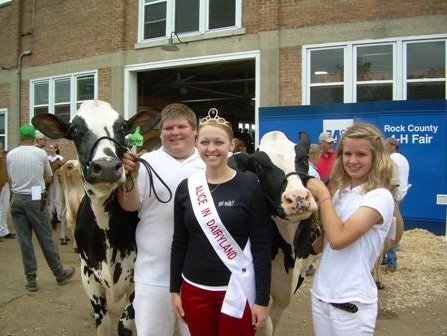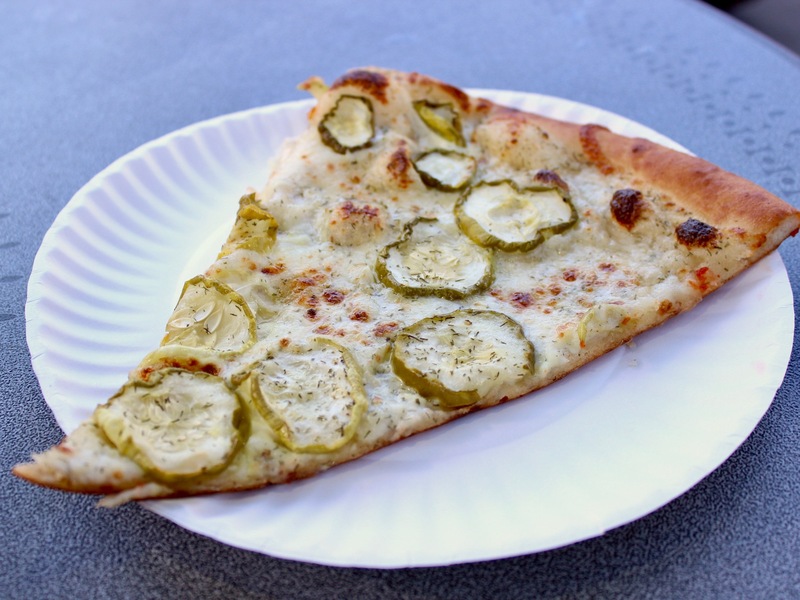She left that gig a few months back when she was named the 62nd Alice in Dairyland -- Wisconsin's Agricultural Ambassador. As Alice, she will log nearly 40,000 miles visiting all 72 of Wisconsin's counties over the next year, but has spent nearly the last two weeks at the State Fair, spreading the word about agriculture in Wisconsin.
She took a few minutes out of her hectic schedule to sit down with OnMilwaukee.com and discuss the state's signature industry.
OnMilwaukee.com: Let's start with the basic background; I know you're not a Milwaukee native, but you do have some fairly deep roots here.
Cheryl O'Brien: I call it my second home. I grew up in Southwest Wisconsin on my family's dairy farm; a small dairy farm that's been in my family for over 100 years. I went to UWM where I studied journalism and mass communications. I spent four years here in college and another year here working at Channel 12. Those five years were really great. Milwaukee is my second home. It's great to be here for the Fair and to come back to town for a few days.
OMC: You've got farm background and also the "in" with the media and the big city connection. How's that helped you spread Alice's message?
CO: It's helped a lot. It's tough pitching an agricultural story to metro media. There might not be as much understanding how agriculture reaches every single person. Everybody is a consumer and when they're buying foods, especially foods from Wisconsin, they're helping our farmers out. When you buy Wisconsin products, you're helping farmers, producers, and the economy. There really is a trickle-down effect or a domino effect. When there's more money being spent on Wisconsin products and Wisconsin farmers, so many more things around the state are effected. There are so many jobs that aren't agriculture but are still tied to agriculture. If there's one job created in agriculture in Wisconsin, there is another job created elsewhere, be it in production, transportation or another related field. All these things are connected to agriculture.
OMC: Does that background help bridge the kind of disconnect that exists between the urban and rural areas?
CO: I think my background helps. I grew up on a farm, and I came to the city. I can better relate to people on both sides of the spectrum. If I am talking to somebody familiar with the industries, I can use terms like agriculture and industry jargon. When talking to people from other areas of the state, I can also explain to them what it means to be an agriculture ambassador; I can break things down so it's easier to understand and people can relate to things easier. Farming, food, other products, fibers, fuels … all the things. I can answer from the rural side and the urban side. I can promote the industry no matter where somebody is from.
OMC: And working in the state's largest television market can't hurt, either.
CO: I hope it helps with the local media. Hopefully, they'll see the importance of agriculture and they can see that it does effect every person. For example, milk prices. Consumers find it hard to understand the milk pricing system when the gallon of milk you buy doesn't change in price. You hear in the news that milk prices are so low and farmers are losing $100 per cow per month right now because prices are so low. I want to help them understand that and show ways we can help them. We need our dairy farmers. They contribute $800 a second to our economy.
OMC: (Eyes popping open)
CO: I saw your eyes bulge. It is a huge impact. Talking to consumers and helping them understand what that means is what I'll be doing all year.
OMC: That's huge number. How is the industry, as a whole, doing in the state considering the state of the economy?
CO: I think it is. Agriculture is a necessity. You need food products. I think agriculture is faring better than other, say luxury industries. It's still hurrying though. Food is a necessity, but people are cutting back on their spending. They may be looking at a generic brand that might come from out-of-state than maybe spending just a little bit more on a brand that may have been produced in Wisconsin. Even though the economy is rough, I think agriculture has been faring better. That doesn't mean my job is over; I still have to help people find Wisconsin products and make the industry stringer.
OMC: You showed dairy cattle here and you know that, during the Junior Dairy Show, there's a theme. This year's was "Eat Local, Eat Dairy." What's the importance of eating local?
CO: It's extremely important. Anytime you buy local, you're helping a state farmer. If everybody in Wisconsin spent just 10 cents of every dollar on Wisconsin products, that keeps about $2 billion in the state economy that would otherwise go elsewhere. It's the trickle-down effect I was talking about. That money stays here and goes back to the farmer. That enables them to buy more land or hire more workers, which then provides more jobs producing more food for more Wisconsinites to buy and the cycle continues. And that goes for any of our industries: buy local, buy Wisconsin.
OMC: People thing agriculture, they think animals meat, cheese and cows.
CO: Agriculture in Wisconsin is a nearly $60 billion industry. When you break it down, yes, the food and farm products -- anything that comes from a farm in Wisconsin -- is the biggest chunk. But there's so many more things. Add in the money farmers spend on their farms for tractors and other equipment and supplies. That counts, too. They're also paying taxes. Farmers pay a lot of money every year in taxes on their land to the city, town, county and state. They contribute so much to the state's economy. Where would the state be without that $60 billion every year?
OMC: What do you want your message to be. Alice represents agriculture overall, but there is a personalized portion of the message, too.
CO: I'm most excited about bringing social media to the program this year. Companies are using Facebook and Twitter to connect to their customers. Agriculture is a business, so we need to be connecting as well. Alice in Dairyland is on Facebook and Twitter. Plus, with my broadcasting background, Alice has been posting videos on YouTube this year, as well. I think that's going to be one of the most interesting things this year, at least for me. Taking cameras around the state onto farms and other places around the state and helping producers see what happens there.
OMC: That should provide some insight: the old "milk doesn't come from the grocery store" adage.
CO: I was just in Door County recently and took my camera with me so I could show people how they harvest several thousand cherries off a cherry tree. You get to see that. These are things that, unless you went and did it yourself, you'd never get to see. It's great to bring that extra connection to the consumer. They can see how things get done and how products get to consumers. It's also great helping the program modernize, as well.
OMC: Alice spends so much time on the road and it's rare to spend this much time in one spot. What's the Fair been like for you?
CO: It's so much fun. I've been here so many times as an exhibitor and helping out a the House of Moo (the dairy educational display) but this time has been really special. I've gotten to meet with a lot of people and hearing from them, helping them promote their products. I've gotten to go to a lot of the radio stations broadcasting live and come on-air with them. Every day, people at different stands say they heard me on the radio. It's a nice partnership, I bring the stations food, they put me on the air.
OMC: You learned the secret during your time in the media: bring food, get coverage.
CO: Food does help! It's been so much fun. I've met with producers. I just came from the beef show and will be heading to the Holstein show tonight and open dairy show tomorrow. It's so much fun for me going to all the different shows. When I was an exhibitor, my focus was on my animals and the work that had to be done. Now I get to get around to the entire agricultural side of the Fair. I've been around the park hundreds of times.
OMC: At the beginning of our chat, you mentioned that you've wanted to be Alice since you were 10 years old. Why is that?
CO: Alice in Dairyland is such a unique job. It's really hard explaining to people that she's an ambassador and not a princess. Yes, I get to wear a tiara. But that's to help gain recognition. The Wisconsin Jewelers Association did such a great job designing it. But its recognizable. You won't see a tiara like this anywhere else, but you notice it. If I was walking down the street with a polo that says "Alice in Dairyland," you might not even notice it. But the tiara stands out. I wish I could stop and talk to everybody but I just love talking about agriculture and talking about Wisconsin.
OMC: OK, last question … where do happy cows really come from?
CO: They come from Wisconsin. I'm asked this many, many times. Wisconsin truly is America's Dairyland. We have 13,000 dairy farms with an average size of about 94 cows and about 99 percent of them are family-owned. Wisconsin has more cheese makers than any other state and has the only master cheese maker program in the United States. Every year in cheese contests, Wisconsin continues to bring home more awards than any other state or any other country. We also make more cheese than any other state. California and Hollywood can keep making their commercials. We'll keep setting the example. Our cows are very happy aand very content right here in Wisconsin.







